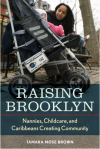Reviews by Eleanor J. Bader
Eleanor J. Bader is a Brooklyn, New York-based activist, teacher, and writer. She writes a monthly column about the anti-abortion right-wing--called Stoking Fire--for RHRealityCheck.org. She also contributes to The Brooklyn Rail, ontheissuesmagazine.com, The Progressive, Truthout.org, and other feminist and left-leaning blogs and publications. In addition to compulsive reading and writing, she is a long-distance urban walker, photographer, and movie-goer.
- 1 of 2
- ››
























